|

“Almost like a real web
site”
|
IN7OMM.COM
• Search |
Contact
• News |
e-News |
• Rumour Mill |
Stories
• Foreign Language
• in70mm.com auf Deutsch
WHAT'S ON IN 7OMM?
7OMM FESTIVAL
• Todd-AO Festival
• KRRR! 7OMM Seminar
• GIFF 70, Gentofte
• Oslo 7OMM Festival
• Widescreen Weekend
TODD-AO
• Premiere |
Films
• People |
Equipment
• Library |
Cinemas
• Todd-AO Projector
• Distortion Correcting
PANAVISION
• Ultra Panavision
70
• Super Panavision
70
|
 |
|
VISION, SCOPE & RAMA
1926
Natural Vision
1929 Grandeur
1930 Magnifilm
1930 Realife
1930 Vitascope
1952 Cinerama
1953
CinemaScope
1955 Todd-AO
1955 Circle Vision
360
1956
CinemaScope 55
1957 Ultra
Panavision 70
1958 Cinemiracle
1958 Kinopanorama
1959 Super
Panavision 70
1959 Super Technirama 70
1960 Smell-O-Vision
1961 Sovscope
70
1962
Cinerama 360
1962 MCS-70
1963 70mm Blow Up
1963 Circarama
1963 Circlorama
1966 Dimension 150
1966
Stereo-70
1967 DEFA 70
1967 Pik-A-Movie
1970 IMAX / Omnimax
1974 Cinema
180
1974 SENSURROUND
1976 Dolby Stereo
1984 Showscan
1984 Swissorama
1986 iWERKS
1989 ARRI 765
1990 CDS
1994 DTS / Datasat
2001
Super Dimension 70
2018 Magellan 65
•
Various Large format
| 70mm to 3-strip |
3-strip to 70mm |
Specialty Large Format |
Special Effects in 65mm |
ARC-120 |
Super Dimension 70
| Early Large Format
• 7OMM Premiere in
Chronological Order
7OMM FILM & CINEMA
• Australia |
Brazil
• Canada |
Denmark
• England |
France
• Germany |
Iran
• Mexico |
Norway
• Sweden |
Turkey
• USA
LIBRARY
• 7OMM Projectors
• People |
Eulogy
• 65mm/70mm Workshop
• The 7OMM Newsletter
• Back issue |
PDF
• Academy of the WSW
7OMM NEWS
• 2026 | 2025 | 2024
• 2023 |
2022 |
2021
• 2020 |
2019 |
2018
• 2017 |
2016 |
2015
• 2014 |
2013 |
2012
• 2011 |
2010 | 2009
• 2008 | 2007 |
2006
• 2005 | 2004 |
2003
• 2002 |
2001 |
2000
• 1999 |
1998 |
1997
• 1996 |
1995 |
1994
|
|
in70mm.com Mission:
• To record the history of the large format movies and the 70mm cinemas
as remembered by the people who worked with the films. Both during
making and during running the films in projection rooms and as the
audience, looking at the curved screen.
•
in70mm.com, a unique internet based magazine, with articles about 70mm
cinemas, 70mm people, 70mm films, 70mm sound, 70mm film credits, 70mm
history and 70mm technology. Readers and fans of 70mm are always welcome
to contribute.
•
Disclaimer |
Updates
• Support us
• Testimonials
• Table of Content
|
| |
| |
Extracts and longer
parts of in70mm.com may be reprinted with the written permission from
the editor.
Copyright © 1800 - 2070. All rights reserved.
Visit biografmuseet.dk about Danish cinemas

|
| |
Todd-AO Festival, Schauburg, Karlsruhe
5. Todd-AO 70mm-Festival 2 - 4 October 2009 |
Read more at
in70mm.com
The 70mm Newsletter
|
| Written,
Performed
and organized by: Herbert Born & Thomas Hauerslev,
Schauburg Cinerama Theatre, Karlsruhe, Germany |
Date:
30.08.2009
Updated
21-01-24 |
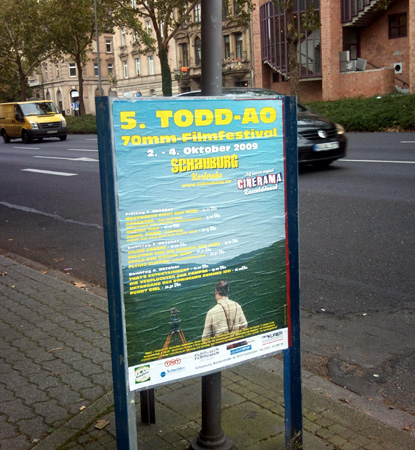 Karlsruhe being dressed up for 70mm festival with posters in city streets. Image by Herbert Born Karlsruhe being dressed up for 70mm festival with posters in city streets. Image by Herbert Born
Dear Friends,
We are now finalizing the 5th instalment of the “Todd-AO 70mm Festival“ to be held this year from 2 - 4 October 2009 at the Schauburg in Karlsruhe, Germany.
This festival, dedicated to a movie format over 50 years old, is a dream for a lot of movie fans around the world. Today, movies and cinemas have reached a time of change – a change from film based to digital cinema and a change in the way movies are felt and understood. We are sure, that our “Todd-AO 70mm Festival” presented on the curved screen of the Schauburg not only will make you remember cinema-going from a time long ago, but also make you aware of the responsibility we all have: To honour the genius of so many people who have given us stories and unforgettable moments in breathtaking and crystal clear large format pictures.
The Schauburg Cinerama is one of the few surviving cinemas, with 70mm projectors, a red curtain and the huge curved and wide 70mm screen. It’s the perfect framework for the presentation of 70mm with 6-track sound. Some films are in original versions and some, "70mm Vintage Classics", are dubbed into German.
The 2009 Weekend program will offer a variety of old 70mm films with a GALA performance on Saturday evening celebrating the world of 70mm film. Traditional breakfast and lunch function on Friday, Saturday and Sunday. Around the world in Three Days on the curved Cinerama screen. Almost everything is screened in the majestic 70mm format at the Schauburg cinema in Karlsruhe.
For three days in October 2009, the famous Cinerama cinema "Filmtheater Schauburg" in Karlsruhe, Germany presents a series of classic film epics in the king of all film formats: 70mm. 70mm film is an experience unlike anything you have ever seen - a High Definition movie experience with extremely sharp images and crystal clear 6 track stereo. Join us and be part of this unique event and share the excitement together with visitors from all around the world - including Holland, Germany, Denmark, England, USA and France - and hopefully many more.
The audience get a lot more out of a film, if presented in 70mm with razor sharp images and crystal clear sound. Films presented in 70mm are an intensive experience, very realistic and almost three dimensional. It is an experience which makes everything you have ever seen on film before pales into insignificance. The audience really get value for their money!
Let us hope, that the splendour of 70mm not only serves our nostalgic dreams, but also offers the chance for a young audience to experience a historic and magic landmark of cinema.
Herbert Born
Schauburg Kino
Karlsruhe, Germany
•
Rückeroberung der Kinos!
•
Reclaim the Cinemas! Schauburg's 5th
Todd-AO Festival in October 2009, in Retrospect
|
More in 70mm reading:
Todd-AO Festival Home
• 5. Todd-AO Festival
• Wilkommen | Welcome
•
Intro | Festival
Images
•
Festival Flyer (PDF)
Festival Archives
•
Festival Through the Years
•
Festival Schedule
and Archive
•
More Schauburg Cinerama
Festivals in Pictures
•
Schauburg Cinerama
•
Best of Todd-AO Festival
• Guests |
Billboards |
Posters
Internet link:
•
Schauburg.de
• Ticket reservation
Filmtheater Schauburg
Att:
Herbert Born
Marienstraße 16
76137 Karlsruhe
Germany
|
Weekend 70mm Program
|
|
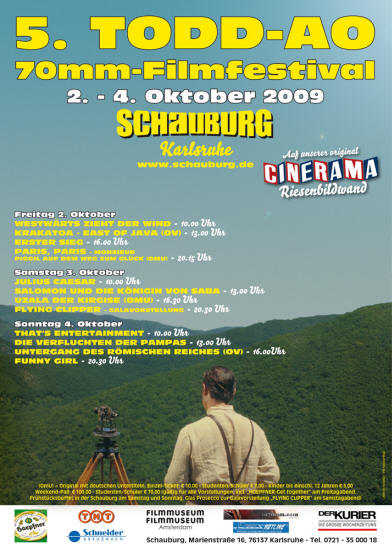 Friday, 2. October 2009 Friday, 2. October 2009
•
"Paint Your Wagon" presented in Panavision 70 (a German vintage
70mm print)
•
"Krakatoa" presented in Todd-AO (an
original vintage
70mm print)
•
"In Harms Way" presented in Panavision 70 (a German vintage
70mm print)
•
"Faubourg 36" presented in Panavision 70 DTS (The
only 70mm print available)
Saturday, 3 October 2009
•
"Julius Caesar" presented in 70mm (a German vintage
70mm print)
•
"Solomon and Sheba" presented in Super
Technirama 70 (a German vintage
70mm print)
•
"Dersu Uzala" presented in Sovscope 70 (a Danish vintage
70mm print, with German and Danish subtitles)
•
"Flying Clipper" presented in a new MCS-70 print
with DTS sound (The only 70mm print available)
Sunday, 4 October 2009
•
"That's Entertainment" presented in 70mm (a German vintage
70mm print)
•
"Savage Pampas" presented in a vintage MCS-70
print (a German vintage 70mm print)
•
"The Fall of the Roman Empire" original version
•
"Funny Girl" presented in Panavision 70 (a German vintage
70mm print)
|
|
Todd-AO Festival Program
Film Information
|
|
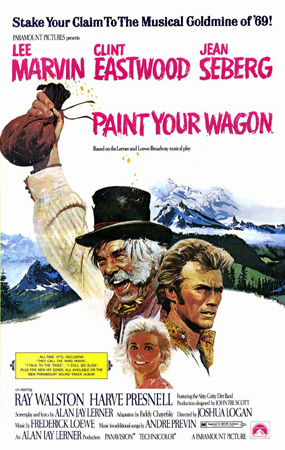 "Paint
Your Wagon" - Friday, 2. October 2009, 10:00 "Paint
Your Wagon" - Friday, 2. October 2009, 10:00
 "Paint
Your Wagon" / "Westwärts
zieht der Wind" (2:20)
(+ intermission).
Filmed in: 35mm, 4 perforations, 24 frames per second. Principal
photography in: Panavision. Presented on:
The curved screen in Panavision 70 with 6-track magnetic stereo.
Aspect ratio: 2,21:1. Country of origin: USA. Production
year: 1969 World Premiere: 15.10.1969. West Germany
premiere: 10.03.1970 "Paint
Your Wagon" / "Westwärts
zieht der Wind" (2:20)
(+ intermission).
Filmed in: 35mm, 4 perforations, 24 frames per second. Principal
photography in: Panavision. Presented on:
The curved screen in Panavision 70 with 6-track magnetic stereo.
Aspect ratio: 2,21:1. Country of origin: USA. Production
year: 1969 World Premiere: 15.10.1969. West Germany
premiere: 10.03.1970
German version
Directed by Joshua
Logan. Writing credits: Paddy Chayefsky (adaptation), Alan Jay Lerner
(musical play "Paint Your Wagon" & screenplay). Produced by Alan Jay
Lerner. Original Music by Nelson Riddle. Cinematography by William A.
Fraker. (director of photography). Film Editing by Robert C. Jones. Fred
Hynes (stereophonic re-recording supervisor), William Randall (sound
mixer)
Lee Marvin (Ben Rumson), Clint Eastwood (Pardner), Jean
Seberg (Elizabeth), Harve Presnell (Rotten Luck Willie), Ray Walston
(Mad Jack Duncan)
40th Anniversary Screening
1970
Nominated Oscar
Best Music, Score of a Musical Picture (Original or
Adaptation) Nelson Riddle
|
|
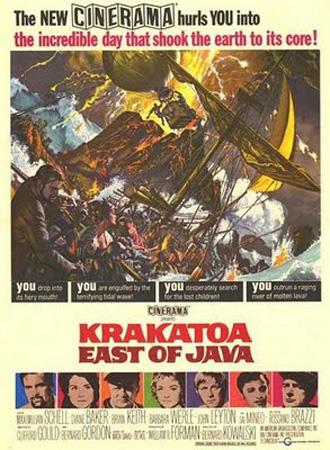 "Krakatoa"
- Friday, 2. October 2009, 13:00 "Krakatoa"
- Friday, 2. October 2009, 13:00
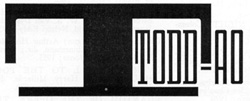 "Krakatoa,
East of Java" / "Krakatoa
- Das größte Abenteuer des letzten Jahrhunderts"
(2:11) (+ intermission).
Filmed in: 65mm, 5 perforations, 24 frames per second. Principal
photography in: Todd-AO. Presented on:
The curved screen in Todd-AO with 6-track magnetic stereo.
Aspect ratio: 2,21:1. Country of origin: USA. Production
year: 1968 World Premiere: 17.03.1969 in Madrid, Spain.
West Germany premiere: 28.03.1969. "Krakatoa,
East of Java" / "Krakatoa
- Das größte Abenteuer des letzten Jahrhunderts"
(2:11) (+ intermission).
Filmed in: 65mm, 5 perforations, 24 frames per second. Principal
photography in: Todd-AO. Presented on:
The curved screen in Todd-AO with 6-track magnetic stereo.
Aspect ratio: 2,21:1. Country of origin: USA. Production
year: 1968 World Premiere: 17.03.1969 in Madrid, Spain.
West Germany premiere: 28.03.1969.
Original roadshow version
Directed by: Bernard L. Kowalski. Writers: Cliff Gould and Bernard
Gordon. Produced by William R. Forman. Original Music by Frank De Vol.
Cinematography by Manuel Berenguer. Film Editing by Walter Hannemann,
Warren Low & Maurice Rootes
Maximilian Schell (Captain Hanson),
Diane Baker (Laura), Brian Keith (Connerly), Barbara Werle (Charley),
Sal Mineo (Leoncavallo), Rossano Brazzi (Giovanni), John Leyton (Rigby)
40th Anniversary Screening
1970 Nominated Oscar
Best Effects, Special Visual Effects Eugène
Lourié |
|
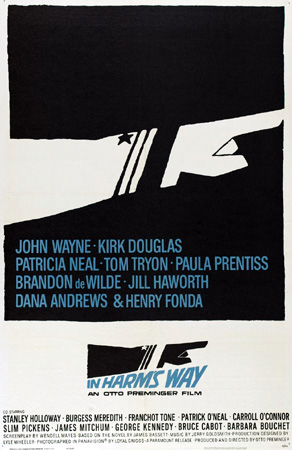 "In
Harm's Way" - Friday, 2. October 2009, 16:00 "In
Harm's Way" - Friday, 2. October 2009, 16:00
 "In
Harm's Way" / "Erster
Sieg"
(2:33) (+ intermission).
Filmed in: 35mm, 4 perforations, 24 frames per second. Principal
photography in: Panavision. Presented on:
The curved screen in Panavision 70 with 6-track magnetic stereo.
Aspect ratio: 2,21:1. Country of origin: USA. Production
year: 1964 World Premiere: 06.04.1965 West Germany
premiere: 13.08.1965 "In
Harm's Way" / "Erster
Sieg"
(2:33) (+ intermission).
Filmed in: 35mm, 4 perforations, 24 frames per second. Principal
photography in: Panavision. Presented on:
The curved screen in Panavision 70 with 6-track magnetic stereo.
Aspect ratio: 2,21:1. Country of origin: USA. Production
year: 1964 World Premiere: 06.04.1965 West Germany
premiere: 13.08.1965
German version
Directed by: Otto Preminger. Writers: James
Bassett (novel) & Wendell Mayes (writer). Produced by Otto Preminger.
Original Music by Jerry Goldsmith. Cinematography by Loyal Griggs. Film
Editing by Hugh S. Fowler & George Tomasini
John Wayne (Capt.
Rockwell Torrey), Kirk Douglas (Commander Paul Eddington Jr.), Patricia
Neal (Lt. Maggie Haynes), Paula Prentiss (Beverly McConnell), Dana
Andrews (Admiral Broderick), Stanley Holloway (Clayton Canfil), Burgess
Meredith (Commander Egan Powell), Slim Pickens (C.P.O Culpepper)
45th Anniversary Screening
1966 Nominated Oscar
Best
Cinematography, Black-and-White Loyal Griggs
|
|
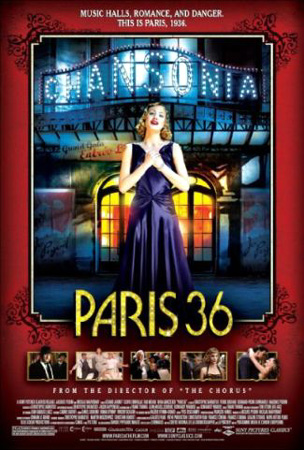 "Faubourg
36" - Friday, 2. October 2009, 20:15 "Faubourg
36" - Friday, 2. October 2009, 20:15
 "Faubourg
36" / "Paris, Paris - Monsieur Pigoil auf dem Weg zum Glück".
Filmed in: 35mm, 4 perforations, 24 frames per second. Principal
photography in: Panavision. Presented on:
The curved screen in a new 70mm print with 6-track DTS stereo.
Aspect ratio: 2,21:1. Country of origin: France.
Production year: 2008 World Premiere: Gaumont Opera cinema,
24.09.2008, France. Also screened at the Toronto Film Festival, Canada 6
September 2008. German premiere: 27.11.2008 "Faubourg
36" / "Paris, Paris - Monsieur Pigoil auf dem Weg zum Glück".
Filmed in: 35mm, 4 perforations, 24 frames per second. Principal
photography in: Panavision. Presented on:
The curved screen in a new 70mm print with 6-track DTS stereo.
Aspect ratio: 2,21:1. Country of origin: France.
Production year: 2008 World Premiere: Gaumont Opera cinema,
24.09.2008, France. Also screened at the Toronto Film Festival, Canada 6
September 2008. German premiere: 27.11.2008
French
version, German subtitles
Director: Christophe Barratier. Writer: Christophe Barratier (writer)
Pierre Philippe (dialogue). Produced by: Original Music by Reinhardt
Wagner. Cinematography by Tom Stern (director of photography). Film
Editing by Yves Deschamps. Production Design by Jean Rabasse
 Gérard
Jugnot (Pigoil), Clovis Cornillac (Milou). Kad Merad (Jacky Nora
Arnezeder (Douce). Pierre Richard (Monsieur TSF), Bernard-Pierre
Donnadieu (Galapiat), Maxence Perrin (Jojo), François Morel (Célestin Gérard
Jugnot (Pigoil), Clovis Cornillac (Milou). Kad Merad (Jacky Nora
Arnezeder (Douce). Pierre Richard (Monsieur TSF), Bernard-Pierre
Donnadieu (Galapiat), Maxence Perrin (Jojo), François Morel (Célestin
1st anniversary screening (sounds silly, but editor like it)
|
|
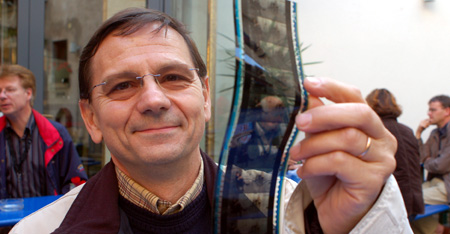 Mr.
Jean Rene Faillot (Arane Laboratory) will be present at the festival and
will be available for Q&A after screening of "Faubourg 36". Image by
Thomas Hauerslev Mr.
Jean Rene Faillot (Arane Laboratory) will be present at the festival and
will be available for Q&A after screening of "Faubourg 36". Image by
Thomas Hauerslev
The setting is spring 1936; a working-class
district in the north of Paris. This neighborhood probably had a name
once but now everyone simply calls it the Faubourg. In early may, three
residents of the Faubourg - Pigoil, Milou, and Jacky - still sulk over
the closing of the Chansonia four months ago. Supported by the locals
who live to the rhythm of monsieur Tsf’s radio, the three friends decide
to take hold of their destiny by producing the “hit” musical the
Chansonia has always needed. With the help of the town, and the arrival
of a mysterious and beautiful young actress named Duce, Pigoil, Milou,
and Jacky bring the magic of the stage back to the Chansonia.
"Faubourg 36" in 70mm in Paris, France
"Faubourg 36" Official movie site
|
|
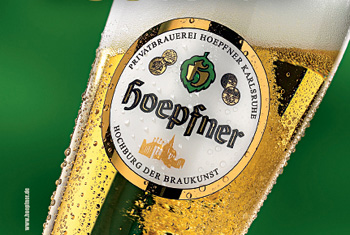 Stay
after "Faubourg 36" and taste the local beer from Privatbrauerei
Hoepfner GmbH Stay
after "Faubourg 36" and taste the local beer from Privatbrauerei
Hoepfner GmbH
Hoepfner ist ein Traditionsunternehmen. 1798 gegründet, gehört die
Brauerei zu den ältesten noch aktiven Unternehmen in Karlsruhe. Gebraut
und abgefüllt wird bis heute in der 1896 erbauten „Hoepfner Burg“ in der
Karlsruher Oststadt. „Frischer Wind in alten Mauern“ drückt den Willen
aus, Altbewährtes mit neuen Ideen zu verbinden. Innerhalb der
historischen Mauern findet sich ein hochmoderner und innovativer Betrieb,
der nach den Firmenleitlinien „Qualität, Kontinuität und Partnerschaft“
geführt wird. |
|
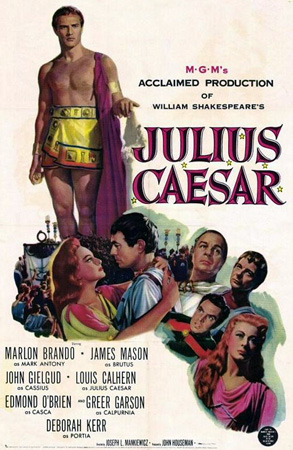 "Julius Caesar" - Saturday, 3. October 2009, 10:00 "Julius Caesar" - Saturday, 3. October 2009, 10:00
"Julius Caesar" (1:57). Filmed in: 35mm, 4 perforations, 24 frames per second. Principal photography in: Academy. Presented on: The curved screen in 70mm with 6-track magnetic stereo. Aspect ratio: 2,21:1 tilt and scan. Country of origin: USA. Production year: 1953 World Premiere: 04.06.1953 West Germany premiere: 13.1.1953. London re-release 01.11.1969
German version
Directed by Joseph L. Mankiewicz. Writing credits William Shakespeare (play) Joseph L. Mankiewicz (screen play). Produced by John Houseman. Original Music by Miklós Rózsa. Cinematography by Joseph Ruttenberg. Film Editing by John D. Dunning
Marlon Brando (Mark Antony), James Mason (Brutus), John Gielgud (Cassius), Louis Calhern (Julius Caesar), Edmond O'Brien (Casca), Greer Garson (Calpurnia), Deborah Kerr (Portia)
40th anniversary screening of 70mm release
1954 Oscar Winner
Best Art Direction-Set Decoration, Black-and-White Cedric Gibbons, Edward C. Carfagno, Edwin B. Willis and Hugh Hunt
Nominated Oscar
Best Actor in a Leading Role Marlon Brando
Best Cinematography, Black-and-White Joseph Ruttenberg
Best Music, Scoring of a Dramatic or Comedy Picture Miklós Rózsa
Best Picture John Houseman
Buy the ouverture
|
|
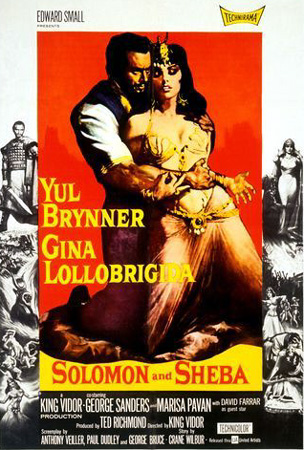 "Solomon and Sheba" - Saturday, 3. October 2009, 13:00 "Solomon and Sheba" - Saturday, 3. October 2009, 13:00
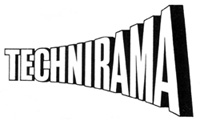 "Solomon and Sheba" / "Salomon und die Königin von Saba" (2:19) (+ intermission). Filmed in: 35mm, 8 perforations, 24 frames per second. Principal photography in: Technirama. Presented on: The curved screen in Super Technirama 70 with 6-track magnetic stereo. Aspect ratio: 2,21:1. Country of origin: USA. Production year: 1959 World Premiere: 27.10.1959 Astoria, London, England. West Germany premiere: 25.12.1959 "Solomon and Sheba" / "Salomon und die Königin von Saba" (2:19) (+ intermission). Filmed in: 35mm, 8 perforations, 24 frames per second. Principal photography in: Technirama. Presented on: The curved screen in Super Technirama 70 with 6-track magnetic stereo. Aspect ratio: 2,21:1. Country of origin: USA. Production year: 1959 World Premiere: 27.10.1959 Astoria, London, England. West Germany premiere: 25.12.1959
German version
Directed by King Vidor. Written by Anthony Veiller, Paul Dudley & George Bruce. Produced by Ted Richmond. Original Music by Mario Nascimbene. Cinematography by Freddie Young. Film Editing by Otto Ludwig.
Yul Brynner (Solomon), Gina Lollobrigida (Sheba), George Sanders (Adonijah), Marisa Pavan (Abishag), Finlay Currie (David), Harry Andrews (Baltor)
50th Anniversary of Technirama process and 50th anniversary screening
Technirama story by Grant Lobban
Technirama story by Christian Appelt (German and English) |
|
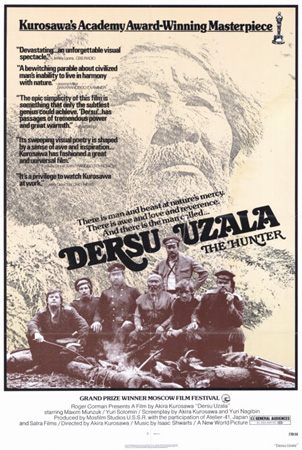 "Uzala, der Kirgise” - Saturday, 3. October 2009, 16:30 "Uzala, der Kirgise” - Saturday, 3. October 2009, 16:30
 “Дерсу Узала”/ "Uzala, der Kirgise” (2:24). Filmed in: 70mm, 5 perforations, 24 frames per second. Principal photography in: Sovscope 70. Presented on: The curved screen in Sovscope 70 with 6-track magnetic stereo. Aspect ratio: 2,21:1. Country of origin: USSR. Production year: 1974 World Premiere: July 1975, Moscow. West Germany premiere: 12.11.1976 “Дерсу Узала”/ "Uzala, der Kirgise” (2:24). Filmed in: 70mm, 5 perforations, 24 frames per second. Principal photography in: Sovscope 70. Presented on: The curved screen in Sovscope 70 with 6-track magnetic stereo. Aspect ratio: 2,21:1. Country of origin: USSR. Production year: 1974 World Premiere: July 1975, Moscow. West Germany premiere: 12.11.1976
Russian version, Danish and German subtitles
Director & writer: Akira Kurosawa. Produced by: Yoichi Matsue & Nikolai Sizov. Original Music by: Isaak Shvarts. Cinematography by: Fyodor Dobronravov, Yuri Gantman & Asakazu Nakai. Art Direction by: Yuri Raksha
Maksim Munzuk (Dersu Uzala), Yuri Solomin (Captain Vladimir Arseniev), Svetlana Danilchenko (Mrs. Arseniev), Dmitri Korshikov (Wowa son of Arsenjev), Suimenkul Chokmorov (Jan Bao), Vladimir Kremena (Turtwigin), Aleksandr Pyatkov (Olenin).
35th anniversary of production year
1976 Won Oscar
Best Foreign Language Film
|
|
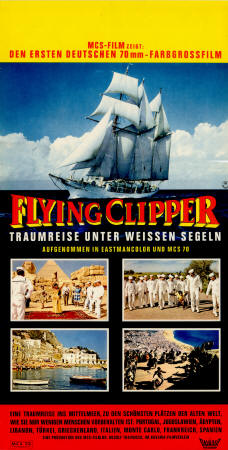 "Flying Clipper” - Saturday, 3. October 2009, 20:30 "Flying Clipper” - Saturday, 3. October 2009, 20:30
 Flying Clipper - Traumreise unter weissen Segeln" / "Mediterranean Holiday" (2:38) (+ intermission). Filmed in: 65mm, 5 perforations, 24 frames per second. Principal photography in: MCS-70 Superpanorama. Presented: on the curved screen in MCS-70 Superpanorama with 6-track DTS stereo. Aspect ratio: 2,21:1. Country of origin: Germany. Production year: 1962 World Premiere: 19.12.1962, München, Germany. Flying Clipper - Traumreise unter weissen Segeln" / "Mediterranean Holiday" (2:38) (+ intermission). Filmed in: 65mm, 5 perforations, 24 frames per second. Principal photography in: MCS-70 Superpanorama. Presented: on the curved screen in MCS-70 Superpanorama with 6-track DTS stereo. Aspect ratio: 2,21:1. Country of origin: Germany. Production year: 1962 World Premiere: 19.12.1962, München, Germany.
German version
Directed by Hermann Leitner & Rudolf Nussgruber. Written by Hans D. Bove, Arthur Elliott, Karl Hartl & Gerd Nickstadt. Produced by Rudolf Travnicek, Claus Hardt & Juan C. Hutchinson. Music by Riz Ortolani. Cinematography by Tony Braun, Siegfried Hold, Heinz Hölscher, Klaus König & Bernhard Stebich
Hans Clarin (Sprecher (voice)
German version
 The first film in MCS-70 Superpanorama. Released 1964 as "Mediterranean Holiday" in "Wonderama" the US with new material added. The first film in MCS-70 Superpanorama. Released 1964 as "Mediterranean Holiday" in "Wonderama" the US with new material added.
Jan Jacobsen designed the MCS-70 Superpanorama camera
Traumreise Unter Weissen Segelen posters and images |
|
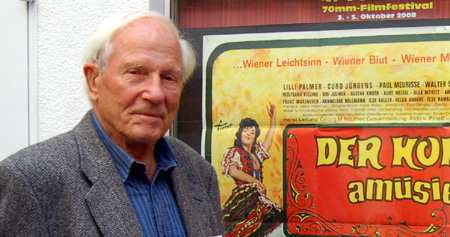 Hein
Hölscher will attend gala re-premiere. Heinz Hölscher was director of
photography of "Flying Clipper". Image Thomas Hauerslev. Hein
Hölscher will attend gala re-premiere. Heinz Hölscher was director of
photography of "Flying Clipper". Image Thomas Hauerslev.
HEINZ HÖLSCHER, Munich; DoP since 1951 on more then 80 feature films.
Worked with M.C.S. cameras for "Flying Clipper", "Der Kongress
amüsiert sich". German award for his camera work on "Uncle Toms
Cabin" in 1966. Member of B.V.K.
Without the memories and detailed explanations of these men this brief
history of M.C.S. would not be possible.
imdb.com |
|
Get a closer look at the Todd-AO projector
on display in Schauburg foyer
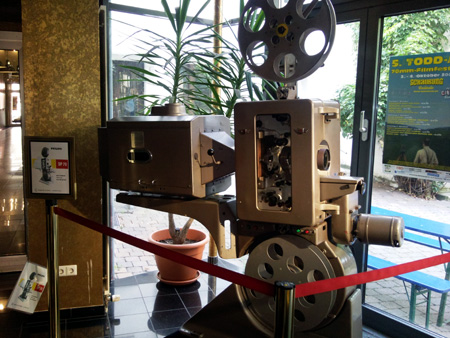 DP70
on display in Schauburg foyer during Todd-AO Festival. Image by Herbert
Born. DP70
on display in Schauburg foyer during Todd-AO Festival. Image by Herbert
Born.
The birth of the DP70 projector dates back to October 1952 and the
beginning of the Todd-AO process.
Michael Todd, not satisfied with technical limitations of the
Cinerama process, he formed a company with some investors, including Rodgers
and Hammerstein II, Joe Schenk and George Skouras and named it MAGNA. The
purpose of Magna was to develop a new wide screen process.
Magna
Theatre Corporation commissioned American Optical company to
develop the system which was named Todd-AO. For
Todd-AO a new projector was required.
Unable to make one in-house, American Optical Company asked several US projector companies to build a new
70mm projector. None of them, however, believed a completely new 70mm projector could
be ready in only 9 months as required. Read
full story
|
|
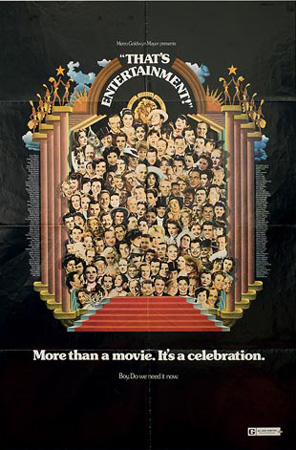 "That's Entertainment" - Sunday, 4. October 2009, 10:00 "That's Entertainment" - Sunday, 4. October 2009, 10:00
"That's Entertainment" / "Das gibt's nie wieder" (2:14) (+ intermission). Filmed in: 35mm, 4 perforations, 24 frames per second. Principal photography in: Academy, widescreen and CinemaScope. Presented on: The curved screen in 70mm with 6-track magnetic stereo. Aspect ratio: pillar box and letterbox. Country of origin: USA. Production year: 1974 World Premiere: 23.05.1974 West Germany premiere: 14.03.1975
German version, with songs in English
Written, Produced & Directed by Jack Haley Jr. Original Music by Henry Mancini. Cinematography by Allan Green, Ennio Guarnieri, Ernest Laszlo, Russell Metty & Gene Polito. Film Editing by David E. Blewitt
Fred Astaire, Bing Crosby, Gene Kelly, Peter Lawford, Liza Minnelli, Donald O'Connor, Debbie Reynolds, Mickey Rooney, Frank Sinatra, James Stewart, Elizabeth Taylor, June Allyson, Leslie Caron, Cyd Charisse, Maurice Chevalier, Joan Crawford, Jimmy Durante
35th Anniversary screening
|
|
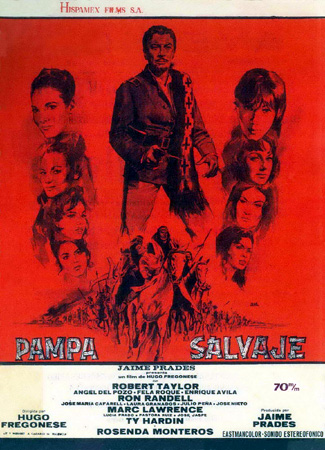 "Savage Pampas" - Sunday, 4. October 2009, 13:00 "Savage Pampas" - Sunday, 4. October 2009, 13:00
 "Savage Pampas" / "Die Verfluchten der Pampas" (1:52). Filmed in: 65mm, 5 perforations, 24 frames per second. Principal photography in: MCS-70 Superpanorama. Presented on: The curved screen in MCS-70 Superpanorama with 6-track magnetic stereo. Aspect ratio: 2,21:1. Country of origin: Spain/Argentina/USA. Production year: 1966 World Premiere: 19.07.1966, Ocean, Buenos Aires, Argentina. West Germany premiere: 29.07.1966. "Savage Pampas" / "Die Verfluchten der Pampas" (1:52). Filmed in: 65mm, 5 perforations, 24 frames per second. Principal photography in: MCS-70 Superpanorama. Presented on: The curved screen in MCS-70 Superpanorama with 6-track magnetic stereo. Aspect ratio: 2,21:1. Country of origin: Spain/Argentina/USA. Production year: 1966 World Premiere: 19.07.1966, Ocean, Buenos Aires, Argentina. West Germany premiere: 29.07.1966.
German version
Directed by Hugo Fregonese. Writing credits Homero Manzi (novel) and Ulises Petit de Murat (novel). Hugo Fregonese (writer) and John Melson (writer). Produced by Jaime Prades. Original Music by Waldo de los Ríos. Cinematography by Manuel Berenguer. Film Editing by Juan Serra.
Robert Taylor (Captain Martín), Ron Randell (Padrón), Marc Lawrence (Sargent Barril), Ty Hardin (Miguel Carreras), Rosenda Monteros (Rucu), Ángel del Pozo (Lt. Del Río), Felicia Roc (Camila Ometio), Charles Fawcett (El Gato, Private)
Filmed in MCS-70 Superpanorama.
Jan Jacobsen designed the MCS-70 Superpanorama camera |
|
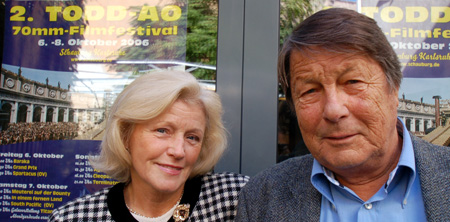 Dieter Gäbler will attend screening and be available for a Q/A after film. Dieter Gäbler was camera assistant on "Savage Pampas". Image Thomas Hauerslev. Dieter Gäbler will attend screening and be available for a Q/A after film. Dieter Gäbler was camera assistant on "Savage Pampas". Image Thomas Hauerslev.
DIETER
GAEBLER, Gräfelfing; DoP, worked for „Modern Cinema Systems KG“ and was
involved in the shooting of a lot of M.C.S. movies. He did a few sequences with
the M.C.S. camera for "Grand Prix" and "2001: A Space Odyssey".
Without him we would not have been able to clear a lot of detailed questions
regarding M.C.S.
imdb.com
|
|
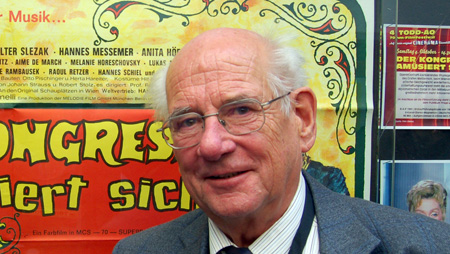 Gerhard
Fromm will attend the 5th Todd-AO festival. Image Thomas Hauerslev. Gerhard
Fromm will attend the 5th Todd-AO festival. Image Thomas Hauerslev.
GERHARD
FROMM, Munich; inventor, author of numerous technical publications and
filmtechnique historian. He was a tremendous source of information about
Jan
W. Jacobsen. Assistant cameraman with the M.C.S. production "Uncle Toms
Cabin". Owner of company „Filmtechnik Fromm“ and member of the B.V.K.
imdb.com |
|
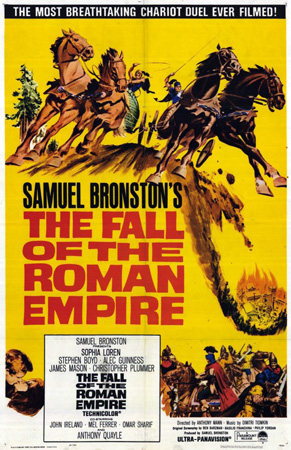 "The Fall of the Roman Empire" - Sunday, 4. October 2009, 16:00 "The Fall of the Roman Empire" - Sunday, 4. October 2009, 16:00
 "The Fall of the Roman Empire" / "Der Untergang des römischen Reiches" (3:11) (+ intermission). Filmed in: 65mm, 5 perforations, 24 frames per second. Principal photography in: Ultra Panavision 70. Presented on: The curved screen in Ultra Panavision 70 with 6-track magnetic stereo. Aspect ratio: 2,79:1 *). Country of origin: USA. Production year: 1963 World Premiere: 24.03.1964. West Germany premiere: 12.06.1964. "The Fall of the Roman Empire" / "Der Untergang des römischen Reiches" (3:11) (+ intermission). Filmed in: 65mm, 5 perforations, 24 frames per second. Principal photography in: Ultra Panavision 70. Presented on: The curved screen in Ultra Panavision 70 with 6-track magnetic stereo. Aspect ratio: 2,79:1 *). Country of origin: USA. Production year: 1963 World Premiere: 24.03.1964. West Germany premiere: 12.06.1964.
* ) I would suggest to change the description for "Fall of the Roman Empire" to this: presented on: The curved screen in 70mm with 6 track magnetic. Aspect ratio: 2.21:1. "Fall" was unusual in that to my knowledge it was the only UP70 movie that was only printed in to flat prints (2.21 to 1). This is by the way the supposedly best print of the movie that is still available.
Regards Oliver Klohs
Original version
Directed by Anthony Mann. Written by Ben Barzman, Basilio Franchina & Philip Yordan. Produced by Samuel Bronston. Original Music by Dimitri Tiomkin, Cinematography by Robert Krasker. Film Editing by Robert Lawrence
Sophia Loren (Lucilla), Stephen Boyd (Livius), Alec Guinness (Marcus Aurelius), James Mason (Timonides), Christopher Plummer (Commodus), Anthony Quayle (Verulus), John Ireland (Ballomar), Omar Sharif (Sohamus), Mel Ferrer (Cleander)
45th anniversary screening
1965 Nominated Oscar
Best Music, Score - Substantially Original Dimitri Tiomkin
Samuel Bronston's story by Christian Appelt (German and English)
Samuel Bronston's story by Rainer Hauptmann (German and English)
Director John Landis about
"The Fall
of the Roman Empire". "It's Bad but Big. They don't make 'em like this
anymore: those huge sets and cast of thousands aren't computer-generated but
absolutely real, and those 1964-era actors are a darn sight more interesting
than a lot of those we have on hand today."
|
|
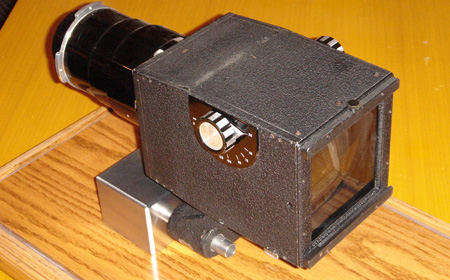 Here’s a photo of a 230mm Focal Length lens that was made and used on “Ben Hur”. Image by Tak Miyagishima Here’s a photo of a 230mm Focal Length lens that was made and used on “Ben Hur”. Image by Tak Miyagishima
These early Camera 65 lenses were all engraved as having a power of 1.33X but were never used having that power. In the midst of the design stage MGM realized that their goal of a 3.00:1 aspect ratio was too wide for the theaters they had in mind to show their productions. So they once again approached us to change the anamorphic power to 1.25X. This still gave them an aspect ratio of 2.75:1 the widest aspect ratio.
Read full story: Ultra Panavision 70, Early lenses
|
|
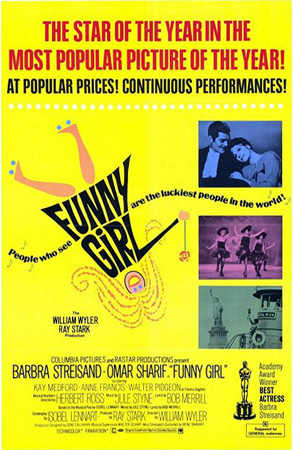 "Funny Girl" - Sunday, 4. October 2009, 20:30 "Funny Girl" - Sunday, 4. October 2009, 20:30
 "Funny Girl" (2:35) (+ intermission). Filmed in: 35mm, 4 perforations, 24 frames per second. Principal photography in: Panavision. Presented on: The curved screen in Panavision 70 with 6-track magnetic stereo. Aspect ratio: 2,21:1. Country of origin: USA. Production year: 1968 World Premiere: 18.09.1968. West Germany premiere: 28.02.1969 "Funny Girl" (2:35) (+ intermission). Filmed in: 35mm, 4 perforations, 24 frames per second. Principal photography in: Panavision. Presented on: The curved screen in Panavision 70 with 6-track magnetic stereo. Aspect ratio: 2,21:1. Country of origin: USA. Production year: 1968 World Premiere: 18.09.1968. West Germany premiere: 28.02.1969
German version
Directed by William Wyler. Writing credits Isobel Lennart (play) & Isobel Lennart (screenplay), Produced by Ray Stark, Cinematography by Harry Stradling Sr., Film Editing by William Sands & Maury Winetrobe
Barbra Streisand (Fanny Brice), Omar Sharif (Nick Arnstein, Kay Medford (Rose Brice), Anne Francis (Georgia James), Walter Pidgeon (Florenz Ziegfeld), Lee Allen (Eddie Ryan)
40th
anniversary screening
1969 Won Oscar
Best Actress in a Leading Role Barbra Streisand. Tied with Katharine Hepburn for The Lion in Winter (1968).
Nominated Oscar
Best Actress in a Supporting Role Kay Medford
Best Cinematography Harry Stradling Sr.
Best Film Editing Robert Swink, Maury Winetrobe and William Sands
Best Music, Original Song Jule Styne (music), Bob Merrill (lyrics) For the song "Funny Girl".
Best Music, Score of a Musical Picture (Original or Adaptation) Walter Scharf
Best Picture Ray Stark
Best Sound |
|
The Schauburg
Cinerama's practical information
| |
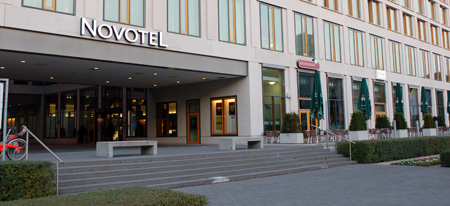 The Novotel Hotel in Karlsruhe. Image by Thomas Hauerslev The Novotel Hotel in Karlsruhe. Image by Thomas Hauerslev
Weekend pass is EURO 100,00. Single entrance EURO 9,00 per show, GALA on Saturday evening EURO 11,00, students EURO 7,00 and children EURO 5,00. weekend-pass for students is Euro 70,00. The weekend pass includes entrance to all screenings at the festival.
The weekend pass includes no accommodation, but we have an arrangement with a very good hotel just around the corner from the cinema. The price per night is EUR 67,00 for one person and EUR
83,00 for 2 persons in a superior double-room without breakfast. A Schauburg tradition served Saturday and Sunday mornings. Breakfast buffet 09.00 Schauburg-foyer (incl. in weekend-pass)
The weekend pass also includes the following additional bonuses:
• Welcome Coffee/Tee, Softdrink on arrival
• Festival Program brochure
• Entrance to Friday's get together with free beer specialties from the local HOEPFNER brewery
• Breakfast buffet on Saturday and Sunday morning at 09.00 in the SCHAUBURG foyer
• Complimentary lunch break on Friday, Saturday and Sunday
• Meet the cameramen from MCS 70
Hotel reservations can be made through Herbert Born or directly at the hotel +49 721 35260. Please remember to ask for the special "Schauburg-Festival" rate.
|
|
2009 Credits. The organisers wish to thank
the following individuals for their help
| |
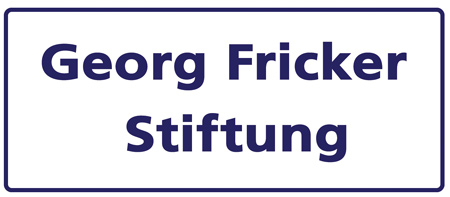 The
Todd-AO 70mm Festival is generously supported by the Georg Fricker
Stiftung The
Todd-AO 70mm Festival is generously supported by the Georg Fricker
Stiftung- Schneider Optics
- Hoepfner Privat Brau
- LaserHotline
- TNT
- Der Kurier
Christian Appelt
Connie Betz
Jürgen Brückner
Jean-René Failliot
Torsten Frehse
Wolfram Hannemann
Hans Hänßler
Thomas Hauerslev
Christine Kummer
Marleen Labijt
Orla Nielsen
Gunter Oehme
Rainer Rother
Clemens Scherer
Corinne Tacchi
Deniz Temel
Norbert Thäder
Galina Shaveika
Rene Wolf
Dr. Peter Kohl
Jakub Klima
Duncan McGregor
Kristian Kossow
Nick Varley
Emeze Nemeth
Hannelore Bollmann-Cantor
Sven Braun
Markus Grasser
Boris Brehm
Rainer Hauptmann
Chris O‘Kane
Team Projektion:
Vincent Koch & Marcus Vetter
|
• Go to
How Georg Fricker became
the owner and operator of the last of Karlsruhe’s “picture palaces”.
•
Wie Georg Fricker
übernahm Karlsruhes letzten Kinopalast
|
|
|
|
Go: back - top - back issues - news index
Updated
21-01-24 |
|
|
 Karlsruhe being dressed up for 70mm festival with posters in city streets. Image by Herbert Born
Karlsruhe being dressed up for 70mm festival with posters in city streets. Image by Herbert Born Friday, 2. October 2009
Friday, 2. October 2009 Mr.
Jean Rene Faillot (Arane Laboratory) will be present at the festival and
will be available for Q&A after screening of "Faubourg 36". Image by
Thomas Hauerslev
Mr.
Jean Rene Faillot (Arane Laboratory) will be present at the festival and
will be available for Q&A after screening of "Faubourg 36". Image by
Thomas Hauerslev Stay
after "Faubourg 36" and taste the local beer from Privatbrauerei
Hoepfner GmbH
Stay
after "Faubourg 36" and taste the local beer from Privatbrauerei
Hoepfner GmbH Hein
Hölscher will attend gala re-premiere. Heinz Hölscher was director of
photography of "Flying Clipper". Image Thomas Hauerslev.
Hein
Hölscher will attend gala re-premiere. Heinz Hölscher was director of
photography of "Flying Clipper". Image Thomas Hauerslev. DP70
on display in Schauburg foyer during Todd-AO Festival. Image by Herbert
Born.
DP70
on display in Schauburg foyer during Todd-AO Festival. Image by Herbert
Born. Dieter Gäbler will attend screening and be available for a Q/A after film. Dieter Gäbler was camera assistant on "Savage Pampas". Image Thomas Hauerslev.
Dieter Gäbler will attend screening and be available for a Q/A after film. Dieter Gäbler was camera assistant on "Savage Pampas". Image Thomas Hauerslev. Gerhard
Fromm will attend the 5th Todd-AO festival. Image Thomas Hauerslev.
Gerhard
Fromm will attend the 5th Todd-AO festival. Image Thomas Hauerslev. Here’s a photo of a 230mm Focal Length lens that was made and used on “Ben Hur”. Image by Tak Miyagishima
Here’s a photo of a 230mm Focal Length lens that was made and used on “Ben Hur”. Image by Tak Miyagishima The Novotel Hotel in Karlsruhe. Image by Thomas Hauerslev
The Novotel Hotel in Karlsruhe. Image by Thomas Hauerslev The
Todd-AO 70mm Festival is generously supported by the Georg Fricker
Stiftung
The
Todd-AO 70mm Festival is generously supported by the Georg Fricker
Stiftung
 "Paint
Your Wagon" - Friday, 2. October 2009, 10:00
"Paint
Your Wagon" - Friday, 2. October 2009, 10:00 "Krakatoa"
- Friday, 2. October 2009, 13:00
"Krakatoa"
- Friday, 2. October 2009, 13:00 "Krakatoa,
East of Java" / "Krakatoa
- Das größte Abenteuer des letzten Jahrhunderts"
(2:11) (+ intermission).
"Krakatoa,
East of Java" / "Krakatoa
- Das größte Abenteuer des letzten Jahrhunderts"
(2:11) (+ intermission).  "In
Harm's Way" - Friday, 2. October 2009, 16:00
"In
Harm's Way" - Friday, 2. October 2009, 16:00 "Faubourg
36" - Friday, 2. October 2009, 20:15
"Faubourg
36" - Friday, 2. October 2009, 20:15 Gérard
Jugnot (Pigoil), Clovis Cornillac (Milou). Kad Merad (Jacky Nora
Arnezeder (Douce). Pierre Richard (Monsieur TSF), Bernard-Pierre
Donnadieu (Galapiat), Maxence Perrin (Jojo), François Morel (Célestin
Gérard
Jugnot (Pigoil), Clovis Cornillac (Milou). Kad Merad (Jacky Nora
Arnezeder (Douce). Pierre Richard (Monsieur TSF), Bernard-Pierre
Donnadieu (Galapiat), Maxence Perrin (Jojo), François Morel (Célestin "Julius Caesar" - Saturday, 3. October 2009, 10:00
"Julius Caesar" - Saturday, 3. October 2009, 10:00 "Solomon and Sheba" - Saturday, 3. October 2009, 13:00
"Solomon and Sheba" - Saturday, 3. October 2009, 13:00 "Solomon and Sheba" / "Salomon und die Königin von Saba" (2:19) (+ intermission).
"Solomon and Sheba" / "Salomon und die Königin von Saba" (2:19) (+ intermission).  "Uzala, der Kirgise” - Saturday, 3. October 2009, 16:30
"Uzala, der Kirgise” - Saturday, 3. October 2009, 16:30 "Flying Clipper” - Saturday, 3. October 2009, 20:30
"Flying Clipper” - Saturday, 3. October 2009, 20:30 Flying Clipper - Traumreise unter weissen Segeln" / "Mediterranean Holiday" (2:38) (+ intermission).
Flying Clipper - Traumreise unter weissen Segeln" / "Mediterranean Holiday" (2:38) (+ intermission).  "That's Entertainment" - Sunday, 4. October 2009, 10:00
"That's Entertainment" - Sunday, 4. October 2009, 10:00 "Savage Pampas" - Sunday, 4. October 2009, 13:00
"Savage Pampas" - Sunday, 4. October 2009, 13:00 "The Fall of the Roman Empire" - Sunday, 4. October 2009, 16:00
"The Fall of the Roman Empire" - Sunday, 4. October 2009, 16:00 "The Fall of the Roman Empire" / "Der Untergang des römischen Reiches" (3:11) (+ intermission).
"The Fall of the Roman Empire" / "Der Untergang des römischen Reiches" (3:11) (+ intermission).  "Funny Girl" - Sunday, 4. October 2009, 20:30
"Funny Girl" - Sunday, 4. October 2009, 20:30